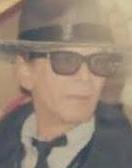Demonstrators sing in front of the Nashville Police Department on August 7, 1961, as they protest what they called police brutality in a racial clash two nights earlier. They criticized “inadequate” police protection and called for qualified black personnel to “replace incompetent officers on the police force.”
The Frist Center for the Visual Arts will present a selection of 50 photographs from the archives of The Tennessean and TheNashville Bannerthat document an important period in Nashville's struggle for racial equality. The black-and-white photographs will be on display from March 30 through October 14, 2018 in the always free Conte Community Arts Gallery.We Shall Overcome opens to the public fifty years after Martin Luther King Jr.'s assassination, at a time when race relations and human rights are again at the forefront of our country's political and social consciousness. The images were taken between 1957, the year that desegregation began in public schools, and 1968, when Dr. King was killed in Memphis. Of central significance are photographs of lunch counter sit-ins led by a group of students—including John Lewis and Diane Nash—from local historically black colleges and universities, which took place in early 1960."The exhibition builds on a recent swelling of interest in the subject throughout the city," writes Frist Center curator Katie Delmez. "The role that Nashville played in the national civil rights movement as a hub for training students in nonviolent protest and as the first city in the Southeast to integrate places of business peacefully is a story that warrants reexamination and introduction to younger generations and newcomers to the region who may not be familiar with this meaningful legacy."
⏩ The photographs are sourced from the archives of Nashville's daily newspapers: The Tennessean and the shuttered Nashville Banner. Some were published, but many were not.The exhibition begins with a selection of images documenting the desegregation of Nashville's public schools in September 1957, three years after the Supreme Court Brown v. Board of Education of Topeka ruling. Early 1960 witnessed the next wave of impactful events, when hundreds of young men and women sat at lunch counters to protest the businesses' refusal to serve African Americans. Despite being assaulted by counter-protestors and arrested for disorderly conduct, the students, mostly from Fisk University, Tennessee A&I (now Tennessee State University), Meharry Medical College, and American Baptist College, remained dedicated to peaceful resistance. In the spring of 1960, the bombing of civil rights attorney Z. Alexander Looby's home spurred as many as four thousand protestors to walk in silence to the Davidson County Courthouse, where Fisk student Diane Nash asked Mayor Ben West if segregation was wrong and if the businesses should be integrated, to which he replied yes.Despite this significant moment, and the resulting desegregation of some businesses in downtown Nashville, there was still much more to be done to advance civil rights in the city. The mid 1960s saw continued demonstrations to desegregate movie theaters, swimming pools, restaurants, the YMCA, and other public places.
During this period, confrontation between protestors and counter-demonstrators or police became at times more tense. "Media, especially reporters and photojournalists from the more progressive Tennessean newspaper, was often there to cover the news-making events," says Delmez. "The exhibition provides an opportunity to consider the role of images and the media in shaping public opinion, a relevant subject in today's news-saturated climate."Publication
“Archie Allen, left, a member of the civil rights demonstrators, talks with employees of the Tic Toc Restaurant on downtown Church Street April 27, 1964. Moments later, Allen was attacked by the employees and knocked down on the sidewalk.” (via The Frist Center)
The Frist Center and Vanderbilt University Press are co-publishing a book titled We Shall Overcome: Press Photographs of Nashville in the Civil Rights Era. The publication will feature 100 plates selected from the archives of The Tennessean and The Nashville Banner. The book will also include a foreword by Congressman John Lewis, who was a leader in the local student nonviolent resistance; an essay outlining the history of the period by Linda Wynn, Fisk University professor and assistant director of the Tennessee Historical Commission; and an overview of the position of photojournalism during the movement by Dr. Susan H. Edwards, photography historian and Frist Center executive director. A timeline and a bibliography will also be featured. The book is edited by Katie Delmez, curator of the accompanying exhibition. Generous support from various community leaders will allow the book to be placed in all Davidson County public schools and libraries.Exhibition CreditThis exhibition was organized by the Frist Center for the Visual Arts.
All images generously provided by The Tennessean and the Nashville Public Library, Special Collections, which houses the Nashville Banner Archives.
Public Programs
Saturday, April 14 "Voices from the Front Lines" A panel discussion with participants in the local civil rights movement, moderated by historian Linda WynnNoon Frist Center Auditorium Hear the stories behind the photographs of We Shall Overcome: Civil Rights and the Nashville Press, 1957–1968, and take a deeper look at the civil rights movement. Moderated by Linda Wynn, this panel will feature first-person accounts by individuals who fought for racial equity in Nashville.
About the Frist Center: Accredited by the American Alliance of Museums, the Frist Center for the Visual Arts is a 501(c)(3) nonprofit art exhibition center dedicated to presenting and originating high-quality exhibitions with related educational programs and community outreach activities. Located at 919 Broadway in downtown Nashville, Tenn., the Frist Center offers the finest visual art from local, regional, national, and international sources in exhibitions that inspire people through art to look at their world in new ways.
SOURCE: Frist Center for the Visual Arts

